From Afghanistan to Westchester
News Based on facts, either observed and verified directly by the reporter, or reported and verified from knowledgeable sources.
Meet two county residents whose relatives escaped the Taliban, and the local volunteers helping them and others risk it all for a better life here.
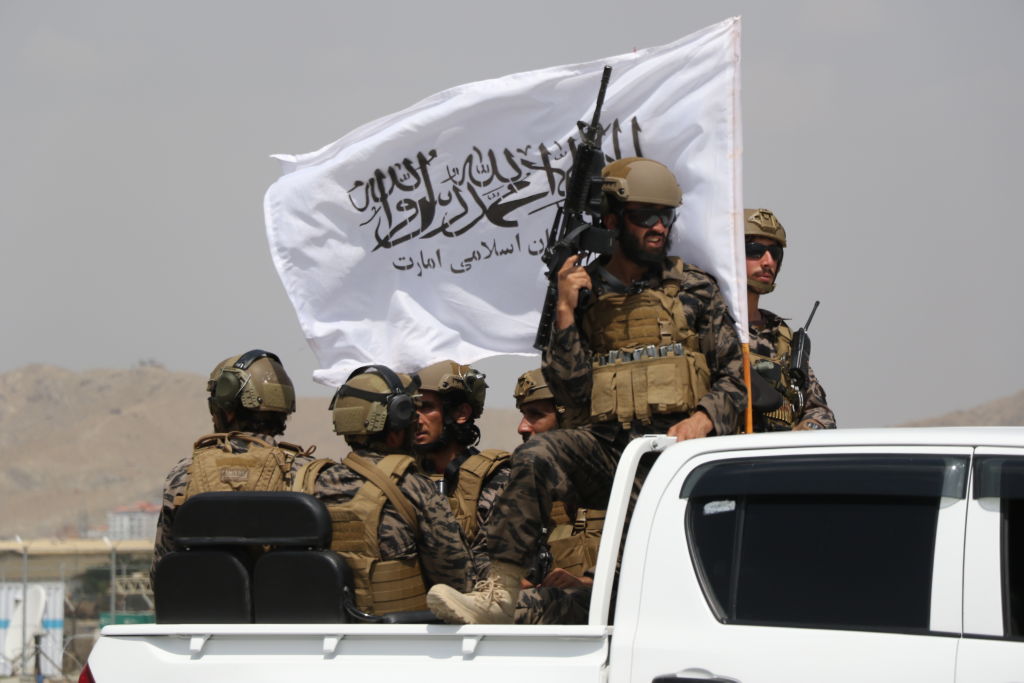
For Ossining resident Sofia Bator, the Taliban’s takeover in her native Afghanistan meant her cousin Freshta Nazari — a 24-year-old women’s rights activist and lawyer — was in grave danger.
“When the Taliban took over Kabul, she was scared for her life,” Bator said. “She left her work, she ran for her life, and she got herself to her room safely.” Once there, Nazari remained hidden in her Kabul apartment for one week, with food and water supplies running out. Nazari, alone and scared for her life, worried she would not make it.
Bator, who attended Westchester Community College last semester, reached out to her former psychology professor, Sheldon Malev, desperate to find a way to get Nazari out of Afghanistan safely. “I was trying to help her because she is not only my cousin, she’s representing all those Afghan women that are suffering through this hardship and situation,” Bator said, noting that Nazari’s profession as an advocate for women and previous work in the Afghan government’s anti-corruption bureau made her particularly vulnerable.

Professor Malev reached out to Greenburgh Town Supervisor Paul Feiner for assistance. From there, Feiner contacted Senator Chuck Schumer and Congressman Mondaire Jones’ offices. “It reminded me of Anne Frank,” Malev said. “[Nazari] was surrounded by people who were going to kill her if she left the apartment.”
Bator knew Nazari needed to get to Hamid Karzai International Airport (HKIA) in Kabul, but it was there that she lost contact with her cousin. As news broke of the suicide bombing outside Abbey Gate on August 26, Bator feared the worst. Luckily, Bator soon received a call from Nazari, who had safely arrived at the U.S. Air Force Base in Germany. Nazari was injured by the Taliban outside of the airport, who were beating Afghans trying to get into HKIA with wire cable whips, and her wounds are being treated in Germany.
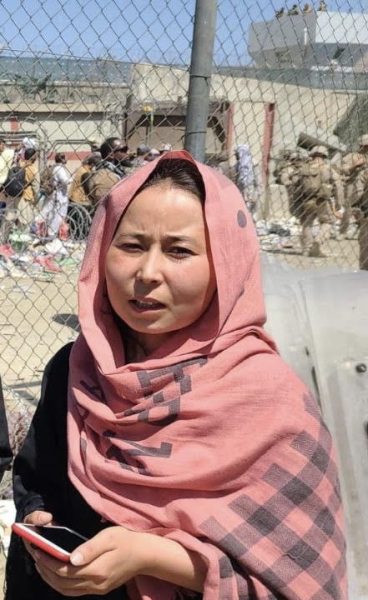
Bator said without the brave U.S. military personnel who risked their lives, Nazari may not have made it to safety. “We really appreciate all those Marines that helped Freshta out,” Bator said. “They are working beyond their duty in Afghanistan.”
Tim, a member of the U.S. Marine Corps, who wished to be referred to only by his first name to protect his anonymity, recounted Nazari’s narrow escape in a letter sent to Malev and shared with Examiner Media. Stationed in the United States, Tim is a member of a unique team of active and retired Marines whose mission is to rescue interpreters and Afghan allies from the Taliban in Afghanistan. Tim’s team leveraged their relationship with one of the Marine commanders working inside HKIA to help get Nazari through.
“Given the situation at HKIA, with the Abbey Gate overwhelmed with Special Immigrant Visa (SIV) applicants, asylum seekers, and American citizens, it was nearly impossible to get through the gate without having someone ‘pull you in,’” Tim said. The commander offered to connect Tim’s team with a recovery team on the ground in Kabul that would help Nazari get into the airport. Meanwhile, Tim’s team compiled all their data on Nazari, entering it into U.S. State Department databases to help assist a streamlined evacuation process.
After encountering many challenges, the recovery team was finally able to locate Nazari in a crowd outside the airport, authenticate her identity with a photo provided by her relatives in the U.S., and get her through the gate.
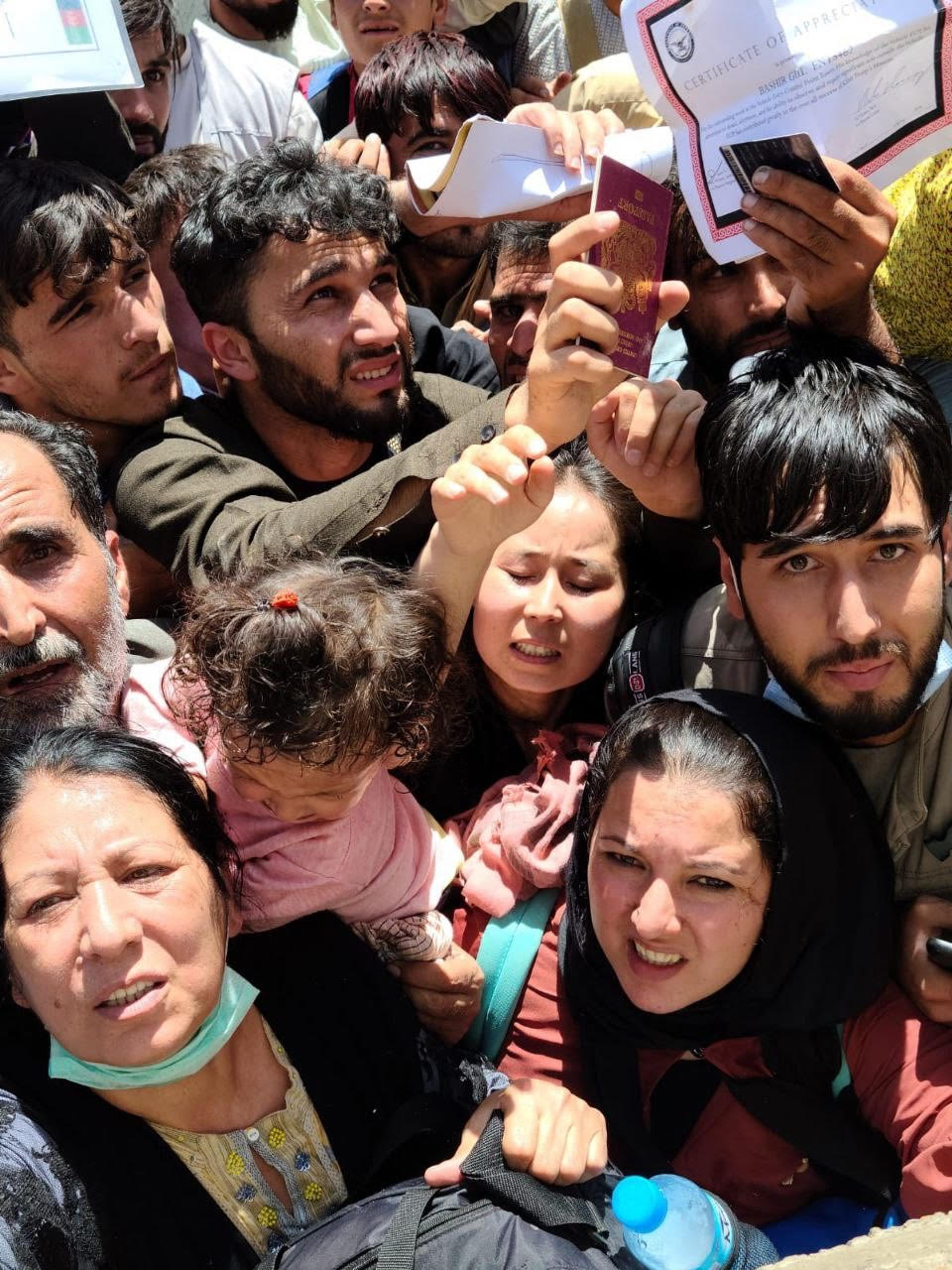
Mike, an ex-Marine who is also an attorney in New York working pro bono for the International Refugee Assistance Project and requested to only be referred by his first name, spoke directly with officials from the State Department and convinced them to allow Nazari to be airlifted out of the country once she was inside the airport.
Nazari had a Nascent visa, and she needed a more authoritative document, Malev said, in order to be airlifted out. “Mike really rescued Freshta a second time because once she got into the airport, they were going to return her to the crowd,” Malev said. “He argued that she deserved to be rescued, and that’s how she managed to get out.”
“Our roles, I argue, pale in comparison to Freshta’s individual actions,” Tim said in the letter. “I cannot even begin to fathom how difficult it was to persist under constant Taliban threat, make it to the gate packed with people, lose the primary means of authentication with the recovery team, and lose cell phone service.
“Despite all the setbacks, she persisted,” Tim continued. “She is out of Afghanistan because she just wouldn’t quit. She is an inspiration to everyone.” Nazari will likely arrive in the United States in two weeks, where she will be reunited with Bator in Westchester.
“We’re going to make sure that she has the support she needs,” Feiner said in a statement to Examiner Media. “Already, volunteers are expressing interest in helping her adjust to life in the United States.” Feiner stressed that members of the local community need to unofficially adopt Nazari, helping her find happiness, employment, and housing in Westchester. “Her suffering needs to end.”
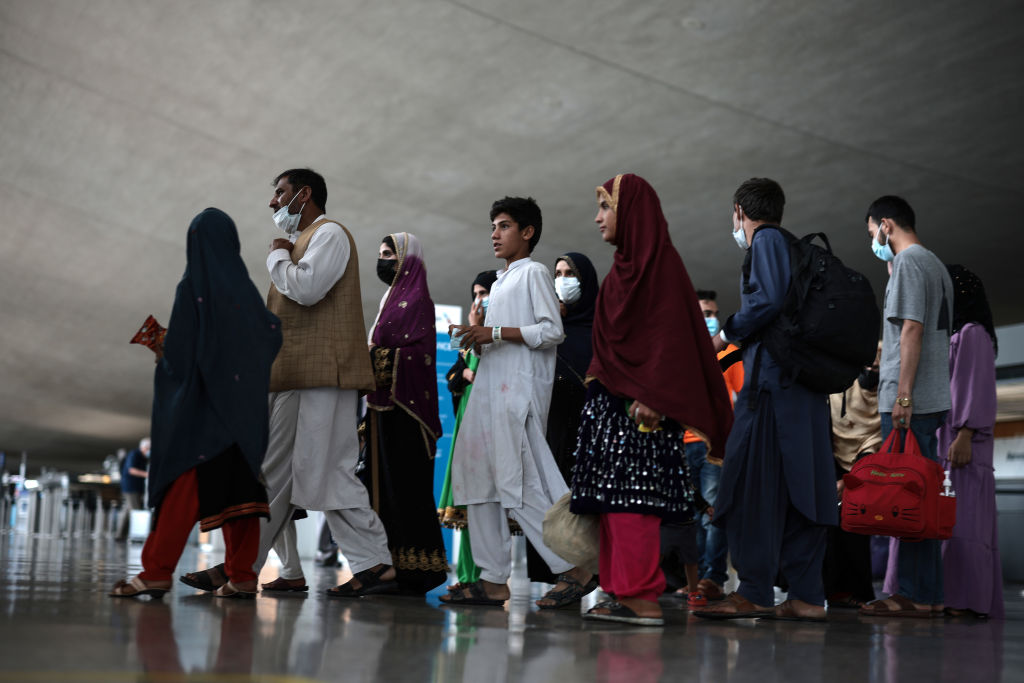
HELPING HANDS FROM WESTCHESTER
In Westchester County, nonprofit organizations and volunteer networks like Hearts and Homes for Refugees and Rivertowns for Refugees are helping refugee families who have relocated to the United States find their footing. Currently, Hearts and Homes for Refugees is working extremely hard to help Afghans eligible for SIV status resettle in the United States, a mission they have fulfilled for the past four years.
“We don’t have a handle on how many are remaining, but before the crisis, there were 18,000 [SIV holders] and their families,” said Kathie O’Callaghan, President and Founder of Hearts and Homes for Refugees. “So a great number of them are left behind.”
According to recent estimates, at least 250,000 Afghans who worked with the U.S., and may be eligible for expedited American visas, as a result, were not evacuated in time for President Biden’s August 31 departure deadline.
“We made a commitment to these people, particularly these SIVs who really put their lives on the line to support our government forces, our troops, and our civilian agencies,” said Steve Grieder, co-founder of Rivertowns for Refugees and a Board Member at Hearts and Homes for Refugees. “And part of that commitment was we’ll take care of you if things go badly, and we’re at that point.”
“This isn’t just a matter of refugees coming in,” Grieder said. “It’s people who have served our country in some capacity, so you can look at them as veterans by any other name.”
“This isn’t just a matter of refugees coming in,” Grieder said. “It’s people who have served our country in some capacity, so you can look at them as veterans by any other name.”
Hearts and Homes for Refugees’ SIV assistance program has ramped up significantly in the last three weeks with the fall of Afghanistan to the Taliban, and as the evacuation of SIVs and their families became the goal, O’Callaghan shared. Currently, 50 volunteers from the lower Hudson Valley work around the clock on 70 cases alongside Congressman Jamaal Bowman and Congressman Mondaire Jones, veterans, and organizations like Veterans for American Ideals, No One Left Behind, and Keeping our Promise.
“They have been working the last three weeks, pretty much day and night on the other end of the line, when they get a case answering questions, redirecting the cases when they hit a wall or go down the wrong road,” O’Callaghan said. “The information as things have heated up has become so much more fluid and uncertain.” Volunteers in the Westchester area have successfully obtained letters of recommendation and employment verification letters for dozens of Afghans. Without these, SIVs are unable to get out of Afghanistan.
One contact with the U.S. Air Force has been amplifying this work on the ground in Afghanistan, sharing and assessing the cases Hearts and Homes for Refugees thought had the best chance to get families to the right gates and flights. So far, eight cases have been successfully evacuated. “Just the bureaucracy [of the SIV process] has slowed down their ability to exit,” Grieder said. “Now we’re at the point where SIVS are being told, ‘you have to try to get to this gate because we have someone there who can verify you based on a photo that you sent to us right now.’”
“The pulse is minute by minute,” Grieder said.
Once SIV families are resettled in Westchester, community sponsorship between resettlement agencies and local faith and civic groups helps to welcome them. Pre-arrival planning includes signing the lease for their apartment, gathering the furniture, and furnishing the home. Once the family arrives, a community sponsor welcomes them at the airport and helps them get acclimated to the community, enrolling children in school, sharing resources, and orienting them to the new town they will call home.
On the first evening, the resettled family is presented with a culturally appropriate meal. A tradition has formed where the last resettled family prepares the meal for the arriving family as a way to welcome them to the local immigrant community in Westchester County.
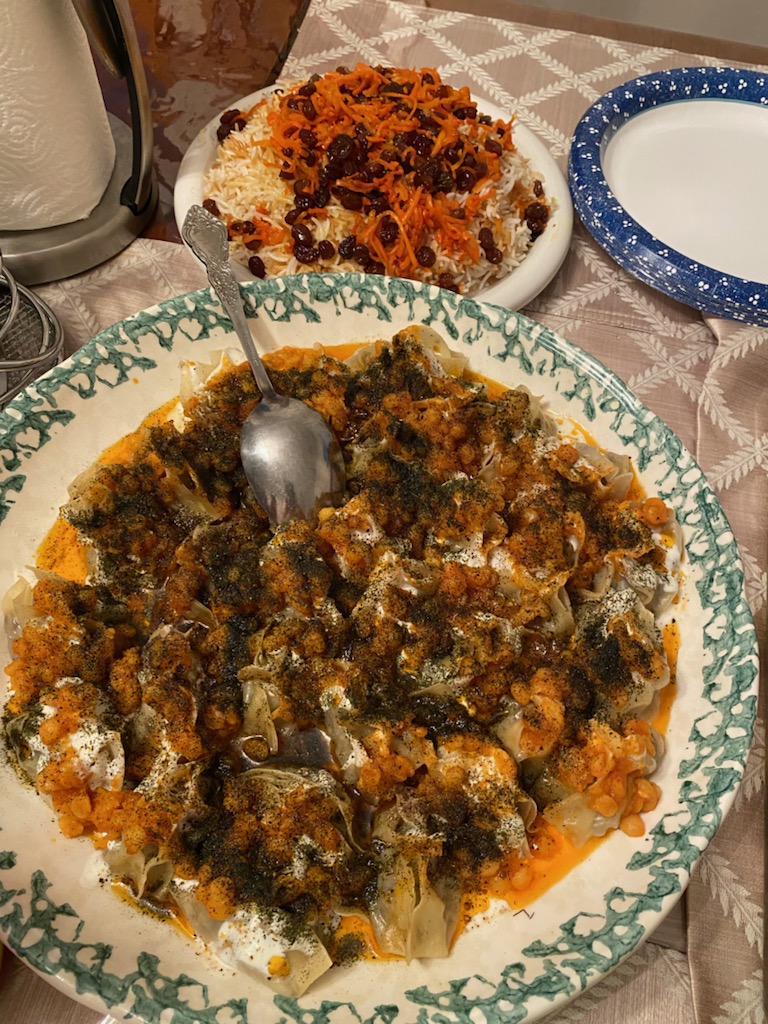
“The goal is to make the transition a little easier without overwhelming them,” O’Callaghan said. “And the overall long-term goals are to give them a leg up and help them become independent within the first six to 12 months.” O’Callaghan explained this forward-thinking work is what they’re looking to build capacity for and fund in the future. “Welcoming refugees, and particularly at this time of the crisis, is the right thing to do.”
A year and a half ago, Fariha Taaj, who used to work as an interpreter for the U.S. military in Afghanistan, resettled in Westchester with her husband after they were granted SIV status.
“HIAS and Rivertowns for Refugees helped us a lot with finding a good job, renting our apartment, and groceries in the beginning,” Taaj said, noting that Kay O’Keefe, co-founder of Rivertowns for Refugees, was instrumental in supporting her and her husband’s needs.
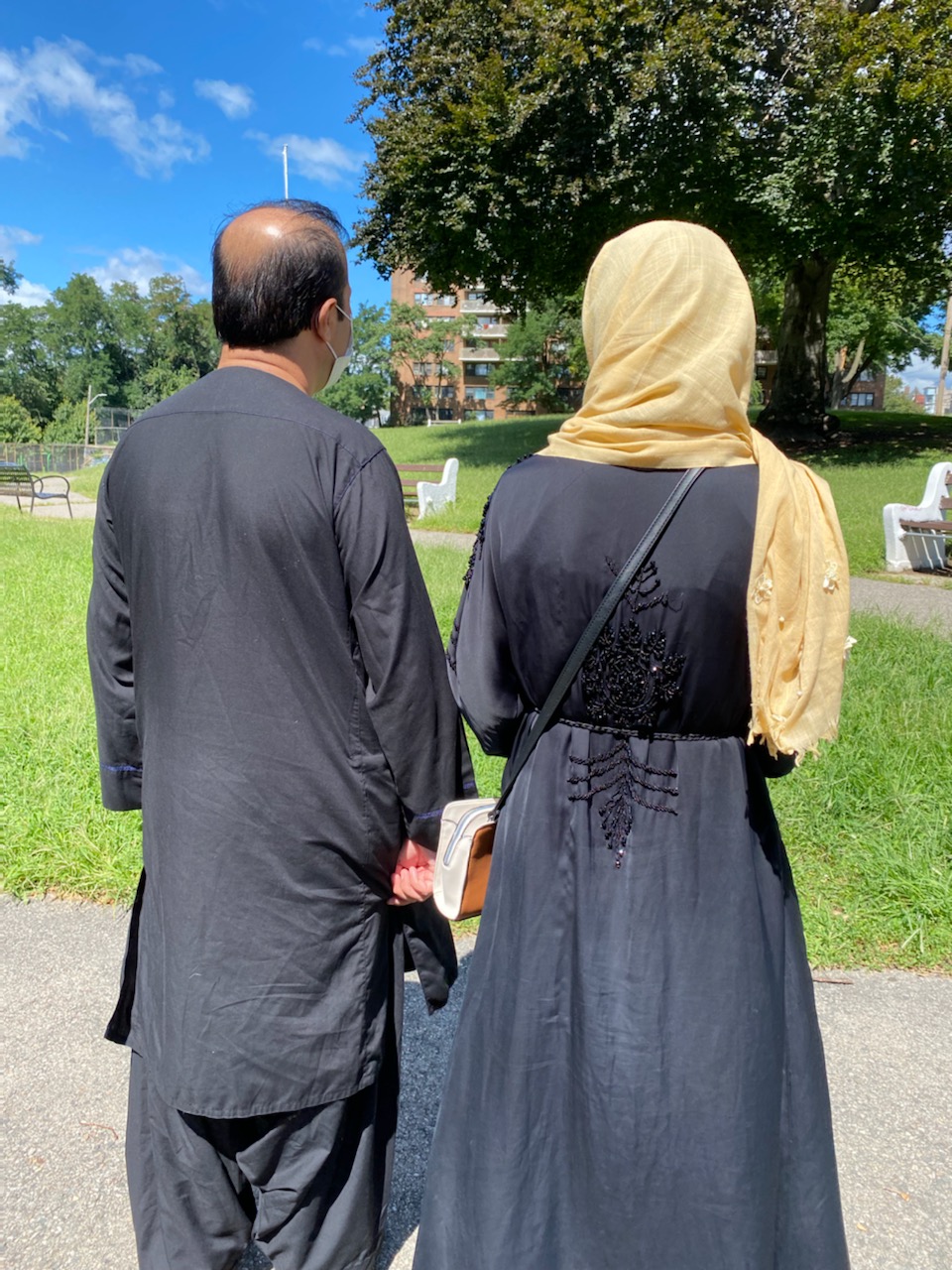
“When we came here, the apartment was ready, there was Afghan food in the fridge, and everything was really nice,” Taaj said. “We didn’t have any relatives here, so it helped us a lot.”
Taaj, who now works in the emergency room at White Plains Hospital, said Rivertowns for Refugees helped them with mock interviews in preparation for getting a job, gave them gift cards for groceries, and helped with everything they needed for a while.
Taaj said that when she and her husband left Afghanistan with their SIV visas, it was like any ordinary trip. Now, the situation has escalated, making it difficult for SIVs to get out.
“The situation in Afghanistan, it’s really hard for people,” Taaj said. “Even if they have their SIV cases or they are a green card holder, they can’t get on the plane.”
Taaj’s mother, who is a green card holder and used to live in California, went back to Afghanistan to see family and got stuck there. After the Taliban takeover, Taaj’s mother, father, two sisters, and brother — all of whom were living in Afghanistan when the U.S.-backed government collapsed — tried to get to the airport.
Initially, the Taliban did not let them get to the gate, Taaj said. “She had their tickets and everything, but she was not able to [get through].”
Fortunately, Taaj’s family was later able to make it out of Afghanistan. Now, they are in Germany on the U.S. Air Force Base, where they will be until getting on a flight to the U.S. in a few days. Taaj’s family will likely arrive in California, where her other brother, an SIV immigrant himself, has been living for many years. Taaj is relieved that her family could get out of Afghanistan safely, but she said she worries about those who are still stuck in the country. “My main concern in Afghanistan is women,” Taaj said. “It affects both men and women, but the main target is women.
“The Taliban doesn’t let them go to school, go to work, they don’t even let them go outside without a man,” Taaj continues. “They don’t have any rights right now in Afghanistan.”
Bailey Hosfelt is a full-time Reporter at Examiner Media, covering LGBTQ+ issues, climate change, the environment, and more. You can follow Bailey on Twitter at @baileyhosfelt.

Examiner Media – Keeping you informed with professionally-reported local news, features, and sports coverage.
